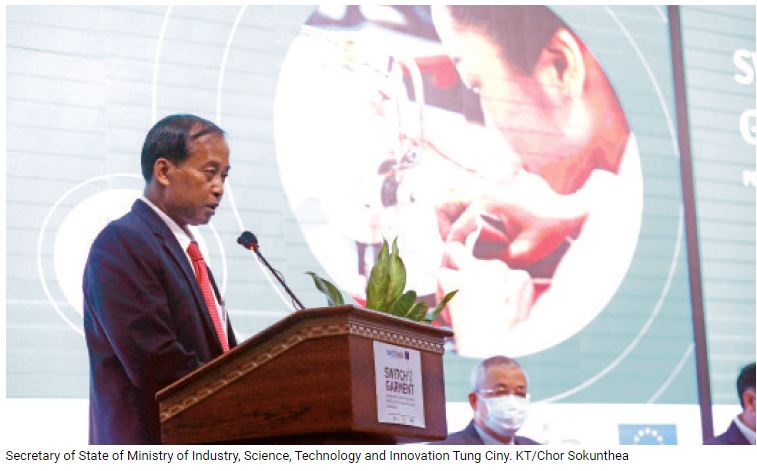Cambodia: Industry to promote sustainable energy
The Garment Manufacturers Association of Cambodia in collaboration with the Global Green Growth Institute (GGGI) and GERES – the Group for the Environment, Renewable Energy and Solidarity, an international development nongovernmental organisation set up in Marseille in 1976 – is jointly implementing the project called the Promotion of Sustainable Energy Practice in the Garment Sector, also known as the Switch Garment Project in Cambodia.
The Switch Garment Project, which is funded by the European Union, officially launched last Friday. The 48-month project is aimed at increasing competitiveness and decreasing the environmental impact of sustainable garment production in Cambodia by increasing investment in sustainable energy practices. This project will address the barriers impeding investment in, and adoption of, sustainable energy practices and develop an innovative and replicable mechanism to engage with the private sector.
Van Sou Ieng, chairman of the Garment Manufacturers Association of Cambodia (GMAC), said the garment sector has played an important role in driving Cambodia’s economy with remarkable development. As demand grows in this sector, some development partners have been considering the environmental impact of the sector, both now and in the future.
“We, GMAC, have been working with Electricite du Cambodge (EDC) for the last few years on policy favourable for clean energy – specifically solar,” he added. “For the global environment, there is a risk until net-zero emissions are reached… What can Cambodia and our industry can do in joining the fight against this climate and environmental risk?” Sou Ieng asked.
Clean, renewable energy, energy efficiency, consuming less and wasting less shall be our current and future compulsory direction, he added. “We need a switch in mindset and behavioural change. This is also beyond our simple moral obligation, but [relates to] future international market demands and rules,” Sou Ieng stressed.
“Many of our main buyers
have already planned to have a climate-neutral supply chain by 2030 and that 100 percent of factories must enrol in energy-efficiency programmes by 2025,” he added.
Sou Ieng said the vision with which GMAC is involved in this project is to help Cambodian Government to establish additional mechanisms and regulations to benefit and encourage the private sector to use renewable energy sustainably. He added that it is a global trend to reduce the environmental impact and Cambodia wants to show other stakeholders that it is also thinking about the environment. Through this economic diversification, reducing the environmental impact of sustainable energy consumption is not only for the garment sector, but also for all sectors that can take advantage of it to supply the production chain as a whole, especially for large sectors such as electronics.
EU Ambassador to Cambodia Carmen Moreno said one of the main challenges for Cambodia
is climate change, therefore, Cambodia’s Switch Garment Project will enable Cambodia to show an ability to save the environment or climate change across the globe. This project is funded by the EU as a whole and individual EU members.
“Through this project, we will promote the participation either voluntarily from garment factories to join the project and hope there will be a collaboration from government, relevant stakeholders and the private sector,” she announced.
“The investment in clean energy is to ensure energy sustainability for Cambodia and it is time to push or prepare and create jobs and boost competitiveness and get a good market for Cambodia,” she also declared.
This project will help Cambodia’s market become more competitive in the global market.
Tin Ponlok, secretary of state of the Ministry of Environment, said this project started in the time that Cambodia’s economy, as well as other economies in the world, are facing severe hardship caused by COVID-19.
Secretary of State of Ministry of Industry, Science, Technology and Innovation Tung Ciny said
the Switch Garment Project is to increase the competitiveness of Cambodian garment factories and reduce the industry’s environmental impact through the adoption of sustainable energy practices and facilitate investments in cleaner technologies.
This project will also help the factory to reduce the cost of electricity and water with high efficiency by using renewable energy.
“It is hoped the project will reduce the emission of greenhouse gases by about 17 percent from the garment sector,” Ciny added.
Source: https://www.khmertimeskh.com/50763442/industry-to-promote-sustainable-energy/


 Thailand
Thailand




